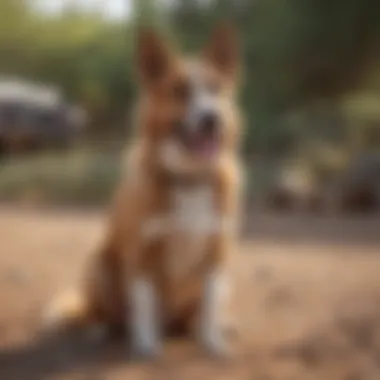Exploring the Vital Role of Dogs in Arizona's Ecosystem


Intro
Dogs are not just pets; they are companions, workers, and invaluable members of many families. In Arizona, the relationship between humans and dogs is particularly significant. This state, known for its diverse landscapes and climate, affects the types of breeds that thrive in its environments. As we explore the role dogs play in Arizona, we will look at suitable breeds, the importance of responsible pet ownership, and the challenges of dog adoption in the region.
The connection between humans and dogs goes beyond mere companionship. Dogs enhance our lives, contribute to local ecosystems, and even help in mental health recovery. However, with this bond comes the responsibility of ensuring their well-being and integration into society. Understanding specific needs of dogs in Arizona, from health challenges posed by heat to training methods, is key for current and potential dog owners alike.
Animal Overview
Common Name and Scientific Classification
The common name for this species is the domestic dog, scientifically classified as Canis lupus familiaris. This classification underscores the close relationship that domestic dogs have with wild wolves, tracing back their ancestry. Understanding their classification opens discussions around behavior, breed variations, and more.
Physical Characteristics
Dogs in Arizona can vary significantly in size, coat type, and color, influenced by the breeds most suitable for desert conditions. Breeds like the Chihuahua and the Australian Cattle Dog feature prominently, with adaptations that help them thrive in high temperatures.
They generally range from small to large, often showing short coats to prevent overheating. In contrast, some breeds boast dense fur, ideally suited to cooler areas, which may require qspecial care to acclimatize them to the heat. Proper grooming is critical, allowing for both comfort and health.
Habitat and Distribution
In Arizona, dogs primarily reside in urban and suburban areas, benefiting from various parks and recreational spaces. The landscape's desert characteristics require thoughtful considerations for dog safety. Accessible resources, from dog-friendly parks to grooming services, initially influence where families decide to live. Ensuring that your dog can drink adequate water and find shade is paramount, especially during the sweltering summer months.
Behavior and Social Structure
Communication Methods
Dogs possess an elaborate system for communication, involving vocalizations, body language, and facial expressions. Whether through barking, growling, or whining, each sound conveys particular messages. For instance, a high-pitched bark might indicate excitement, whereas low, consistent growls might warn of discomfort or threat.
Social Hierarchies
In both natural and domesticated settings, dogs are social animals that thrive on hierarchy. They often develop bonds with other dogs and people, establishing relationships that dictate behavior. Understanding these dynamics can lead to more effective training and bonding experiences.
Mating and Reproductive Behavior
During mating seasons, behaviors can change. Female dogs exhibit specific signs of heat, while male dogs may become more assertive. Understanding these changes is crucial for responsible pet ownership, impacting decisions around spaying or neutering, ensuring animal welfare, and managing local dog populations.
Conservation Status
Current Population Trends
The population of dogs in Arizona is generally stable, with an influx of pets from various parts of the country. However, the trend of dog ownership varies with economic factors, housing availability, and broader cultural shifts. Communities are embracing both adoption and responsible breeding as paths to maintain healthy dog populations.
Threats and Challenges
Challenges arise from issues such as overpopulation in shelters, neglect, and the difficulties surrounding dog adoption. Disparities in access to resources can compound these problems, making awareness and education essential.
Conservation Efforts and Success Stories
Many organizations in Arizona focus on dog welfare, including local shelters that promote adoption events and programs geared towards responsible pet ownership. Collaborations between these shelters and the community have led to notable decreases in euthanasia rates and an increase in successful adoptions. Spaying and neutering initiatives have also proven effective in managing dog populations, illustrating the power of well-organized efforts.
“Community involvement and education are critical in fostering a sustainable model for both dog ownership and welfare in Arizona.”
As we move forward in this exploration of dogs in Arizona, we will delve deeper into the breeds best suited for the environment, the intricacies of responsible pet ownership, and the resources available for dog enthusiasts.
Prologue to Dogs in Arizona
Dogs play a significant role in many people's lives, and Arizona is no exception. The state's unique environment and cultural backdrop greatly influence the relationship between residents and their canine companions. From the breeds that thrive in the state’s climate to the various community efforts focused on dog welfare, understanding these aspects is vital for both current and prospective dog owners.
Historical Context
The connection between dogs and humans in Arizona has deep roots. Native American tribes, such as the Hopi and Navajo, have historically revered dogs for various reasons. They served as hunting companions and even protected homes. Over time, the role of dogs evolved alongside the state’s development. With the influx of settlers and mining communities in the 19th century, various breeds were introduced. This created a melting pot of canine types suited for different purposes.
The rugged landscapes of Arizona shaped breed selection, as only those breeds best suited to survive in extreme heat and varying terrains thrived. Today, the historical importance of dogs is still evident in the state's ongoing relationship with them. Understanding this context adds depth to the current dynamics between residents and their pets.
Cultural Significance
Dogs hold a special place in Arizona’s culture. They are not just pets; they offer companionship and emotional support to their owners. Many Arizona families consider their dogs as part of the family unit. Cultural festivals often include dog-friendly activities, reflecting the community's appreciation for these animals.


Moreover, local organizations promote responsible ownership. Events like adoption drives and educational workshops foster awareness about canine care. The cultural significance of dogs extends into art, literature, and even local folklore. These influences contribute to a broader understanding of the human-dog bond in Arizona.
As the landscape and culture of Arizona continue to evolve, the significance of dogs remains steadfast. They are participants in both daily life and community spirit, highlighting the need to embrace responsible ownership and care.
Popular Dog Breeds in Arizona
Understanding the popular dog breeds in Arizona is essential for current and potential dog owners. The selection of a dog breed should align with the unique climate and lifestyle prevalent in Arizona. Specific breeds adapt better to the heat and arid conditions than others, thereby ensuring both the health of the dog and the satisfaction of the owner. This section emphasizes breeds particularly suited to the state's environment and highlights their respective traits, care requirements, and how they integrate into local communities.
Breeds Suited for Hot Climates
Chihuahua
The Chihuahua is a small breed known for its lively personality and loyalty. This breed does well in Arizona's warm climate mainly due to its size. Their small body allows for easier regulation of body temperature compared to larger breeds. Additionally, Chihuahuas require minimal exercise, which makes them a convenient choice for people living in hot areas.
However, owners must be cautious about overheating. Chihuahuas are susceptible to heat stress, and adequate shade and hydration are vital during extreme temperatures. Overall, their affectionate nature makes them a sought-after companion in Arizona.
Basenji
The Basenji is another breed well-suited for Arizona. Known as the barkless dog, it communicates through unique vocalizations, making them fascinating pets. Their short coat excels in hot weather as it requires little grooming, allowing for easy maintenance.
Moreover, Basenjis are intelligent and independent, which can sometimes pose challenges in training. Owners need to employ consistent and positive reinforcement methods. As they are active dogs, they enjoy mental stimulation through play and exploration. Their adaptability to the climate paired with their quirky nature makes them an appealing choice for many.
Whippet
The Whippet stands out for its impressive speed and slender physique. This breed is often favored by owners in Arizona due to its robustness in handling high temperatures. Whippets also have a short coat, which requires minimal grooming effort, making them ideal pets for the region.
Despite their athleticism, Whippets are surprisingly good at relaxing indoors. They enjoy a good sprint but also appreciate downtime after exercise. Their personable demeanor and adaptability to varied lifestyles can make them a perfect companion for families or individuals.
Breeds for Desert Environments
Australian Cattle Dog
The Australian Cattle Dog is a resilient breed known for its herding capabilities. They thrive in Arizona's extreme climates due to their endurance and strong built. These dogs require regular exercise and mental challenges, which makes them suitable for active individuals or families.
One notable feature of this breed is its agility. Australian Cattle Dogs can navigate difficult terrain, which fits well with Arizona’s varied landscapes. However, they can be overly energetic and require firm training to develop discipline and good behavior, making socialization crucial.
American Pit Bull Terrier
The American Pit Bull Terrier demonstrates loyalty and intelligence. This breed is well-regarded in Arizona for its adaptability to the desert environment. Their coat naturally holds up against heat, making them low-maintenance in terms of grooming.
While often misunderstood, Pit Bulls possess a gentle nature when properly trained. They excel in family settings, as they bond strongly with their humans. Nevertheless, potential owners should be mindful of local regulations concerning this breed, as laws vary regarding ownership and care.
Siberian Husky
The Siberian Husky is an intriguing choice for Arizona, particularly in areas with higher altitudes. While this breed generally prefers cooler climates, they can adapt surprisingly well to Arizona's unique environment, especially if provided with ample shade and water.
Huskies are social dogs, requiring interaction and physical activities. Their striking appearance and playful nature attract many dog enthusiasts. Owners should be aware of their need for exercise, as Huskies easily become bored without enough stimulation. Thus, Husky owners in Arizona should plan for their exercise needs to prevent undesirable behaviors.
Each dog breed has its own unique characteristics and needs. Understanding these elements is vital for successful ownership in Arizona’s specific climate.
Dog Adoption and Rescue Efforts
Dog adoption and rescue efforts are critical components of responsible pet ownership and animal welfare in Arizona. With the state's growing dog population, it is essential for communities to embrace adoption as a means to alleviate the number of animals in shelters. These practices not only save lives but also enrich the lives of families who welcome dogs into their homes.
Overview of Shelter Systems
Arizona has a diverse network of animal shelters and rescue organizations. Most cities support a municipal shelter system that works in tandem with various nonprofit groups. Shelters provide safe haven for dogs, especially those that have been abandoned or mistreated. Awareness of how these systems operate is crucial for potential pet adopters.
Responsible shelters in Arizona often adhere to standards that emphasize humane treatment, public education, and community involvement. Many shelters utilize a foster care system that allows volunteers to care for animals in a home setting. This approach helps pets acclimate to domestic life and increases their chances of adoption.
Notable Shelters and Rescue Organizations
Humane Society of Southern Arizona
The Humane Society of Southern Arizona plays a vital role in promoting the welfare of dogs and other animals. Their focus is on connecting adoptable pets with loving families. One key characteristic is their comprehensive adoption process, which includes home visits and detailed interviews. This focus helps ensure that the right match is made between adopter and pet.
A unique feature of the Humane Society is their community outreach programs, which include educational workshops that promote responsible pet ownership. These initiatives aim to reduce returning pets to shelters and encourage long-term commitment from adopters. However, the shelter can sometimes be overwhelmed with animals, which may delay the adoption process for interested families.


Arizona Animal Welfare League
The Arizona Animal Welfare League is another significant player in the local adoption landscape. This organization emphasizes rescue and rehabilitation efforts, focusing on dogs that require special care. One key characteristic is their holistic approach to adoption. They address not only the necessary vaccinations and spaying or neutering but also the emotional readiness of the pet.
A unique attribute of the Animal Welfare League is their partnerships with local veterinarians. They provide medical care and behavioral training to help dogs transition into new homes. While their focus on rehabilitation is commendable, it may mean a longer wait to find a perfect match for adopters looking for a pet.
By understanding the significance of adoption and the roles these shelters play, potential owners can make informed decisions, leading to better outcomes for pets and families alike.
Legal Responsibilities of Dog Owners in Arizona
Understanding the legal responsibilities of dog owners in Arizona is crucial. These laws help to promote welfare for both dogs and the community. They ensure that pets live harmoniously with people and the environment. Moreover, knowing these regulations enhances the public perception of responsible pet ownership.
City and County Regulations
City and county regulations on dog ownership vary throughout Arizona. Each municipality may have specific ordinances that pet owners must follow. Common regulations often include stipulations about leash laws, noise ordinances, and control of aggressive dogs.
- Leash Laws: Many cities require dogs to be leashed in public spaces. This prevents conflicts between dogs and other community members.
- Noise Ordinances: Owners must manage barking dogs. Excessive barking can lead to complaints and even fines.
- Control of Aggressive Dogs: There are often rules to keep potentially dangerous breeds on muzzles or confined in secure areas. This is to protect the public and other pets.
Each resident should consult local animal control for precise guidance. Understanding these regulations can help avoid legal trouble and encourage a safer environment.
Licensing and Vaccination Requirements
Licensing and vaccination are critical components of responsible pet ownership. In Arizona, the law mandates that all dogs be licensed and vaccinated against rabies. This is essential for public health and safety.
- Licensing: Dog owners must obtain a license, usually through their local city or county. This typically involves a fee and may require proof of vaccination. A license helps to identify lost pets and proves that the owner is taking responsibility.
- Vaccination: Rabies vaccination is mandatory. It protects not only the dog but also other animals and humans. Many localities require annual vaccinations, so staying updated is vital for compliance.
It is important to note that some areas may offer discounts or free vaccinations through community programs. Keeping records of vaccinations and licenses readily available is advisable for all pet owners.
Health and Wellness for Dogs
The health and wellness of dogs is a critical topic that every dog owner should prioritize. Ensuring optimal well-being directly impacts both the quality of life for the pet and the joy it brings to the family. In Arizona, where the environment presents unique challenges, concerned owners must be aware of specific health issues that may affect their furry companions. This section serves to elucidate these common health problems while also providing actionable preventive measures.
Common Health Issues in Arizona
Arizona's diverse climate and ecosystem can pose several health threats to dogs. Some of the most prevalent health issues include:
- Heatstroke: The high temperatures, especially during the summer months, can lead to overheating. Dogs left outside without adequate shade or water are at risk.
- Dehydration: Given the dry climate, dogs can dehydrate quickly. Lack of access to water during walks can escalate this risk.
- Parasites: Fleas, ticks, and heartworm are common in Arizona. The warm environment provides a breeding ground for these parasites.
- Allergies: Arizona has various pollen sources that can trigger allergic reactions in dogs. Symptoms may include itching, redness, and gastrointestinal upset.
- Dental Issues: Problems such as tartar buildup are noticeable. Regular dental care is essential, as many local dogs suffer from periodontal disease.
While some of these health issues are common regardless of location, the unique environment of Arizona means that dog owners must be especially vigilant.
Preventive Measures
Preventing health issues is always preferable to treatment. Here are some effective preventive strategies that every dog owner in Arizona should consider:
- Hydration: Always ensure your dog has access to fresh, clean water. Carry water during walks, especially during warm periods.
- Regular Vet Check-ups: Routine health screenings can catch potential issues early. Vaccinations and parasite treatments should be up to date.
- Shade and Shelter: Provide shaded areas in the yard for your dog. This is critical to avoiding heat exposure.
- Diet and Exercise: Maintain a balanced diet tailored to the dog's breed and age. Regular exercise is essential, but timing is important—avoid walks during the hottest parts of the day.
By prioritizing these preventive measures, pet owners can significantly enhance their dogs' health and longevity.
- Grooming: Regular grooming helps control parasites, manage shedding, and maintain skin health.
- Dental Care: Regular brushing or dental treats can help prevent dental disease.
In summary, being proactive about health and wellness is crucial for dogs in Arizona. Understanding the common health issues and implementing preventive measures can ensure a happier and healthier life for pets. It's not just about avoiding sickness; it's about enhancing the overall quality of life for dogs and their families.
Training and Behavior
Training and behavior are crucial components to the well-being and happiness of dogs in Arizona. This region presents unique challenges due to its climate, lifestyle, and community dynamics. Proper training not only helps in building a strong bond between the dog and its owner but also ensures that dogs are well-adjusted, sociable, and able to navigate their environment confidently. Addressing behavior issues promptly is essential for a harmonious living situation, both for dogs and their human companions.
Basic Training Techniques
Basic training techniques are fundamental for every dog owner. These techniques establish a framework for communication and obedience. Key elements include:
- Positive Reinforcement: Rewarding desirable behaviors with treats or praise motivates dogs to repeat those actions.
- Consistency: Establishing clear commands and consistently applying them helps dogs understand expectations.
- Socialization: Exposing dogs to various environments, people, and other animals can minimize fear and anxiety.
- Short Sessions: Keeping training sessions brief can prevent boredom and help maintain focus.
Effective training can lead to significant improvements in a dog's behavior, enhancing their ability to function in diverse settings.
Addressing Behavioral Issues
Behavioral issues often arise in dogs, making it crucial for owners to recognize and address these problems. Common issues include barking, chewing, and separation anxiety. Here are considerations for dealing with them:


- Identify Triggers: Understanding what causes a dog's behavior can guide owners in finding solutions.
- Seek Professional Help: When issues seem unmanageable, consulting a professional trainer can provide insights and strategies tailored to specific needs.
- Exercise and Mental Stimulation: Adequate physical activity and mental challenges can often mitigate unwanted behaviors.
Addressing behavior issues early leads to better outcomes, ensuring both owners and their dogs can coexist happily and peacefully.
In summary, comprehensive training and effective behavior management are key for fostering a thriving relationship between dogs and their owners in Arizona. Prioritizing these aspects can significantly impact the overall quality of life for both parties.
Socialization and Community Involvement
Socialization and community involvement are crucial for the well-being of dogs and their owners in Arizona. In a state known for its diverse environments and vibrant communities, facilitating interactions between dogs and their surroundings enhances both the social skills of dogs and the quality of life for their owners. This section examines how dog owners can prioritize socialization and engage with local communities to maximize their experience with their pets.
Local Dog Parks and Recreation Areas
Arizona boasts an array of dog parks and recreation areas catering to various needs. These spaces allow dogs to roam and interact off-leash, providing essential opportunities for socialization. Notable parks, like the Papago Park Dog Park and the Fountain Hills Dog Park, offer open areas fitted with agility equipment and shaded spots for rest. The benefits of frequenting these parks include:
- Social Skills Development: Regular visits encourage dogs to interact with others. This helps reduce anxiety, fear-based behaviors, and increases comfort in unfamiliar situations.
- Physical Exercise: Running and playing in a park setting keeps dogs physically fit. Engaging in activities with other dogs also promotes healthy play behavior.
- Community Bonds: Dog parks create a social environment for owners, fostering friendships and networks among dog enthusiasts.
When visiting these parks, it is crucial to monitor your dog’s behavior and ensure they are well-mannered. A positive experience for dogs and their owners alike fosters an inclusive community spirit.
Community Events and Activities
Community events focused on dogs serve to further enrich the bond between owners and their pets. Local shelters and organizations often host events, such as adoption days, dog shows, and dog training workshops. These activities not only spotlight the joy dogs bring into our lives but also raise awareness about responsible ownership and adoption.
In Arizona, you can participate in various gatherings that include:
- Paw-fect picnics: These are informal meetups at local parks with food, games, and fun activities, often benefiting local rescues.
- Pet parades: A fun way to showcase dogs in the community while celebrating their uniqueness through contests and prizes.
- Training clinics: Events that bring expert trainers to guide owners on effective behavioral techniques, emphasizing mutual respect between dogs and owners.
Involvement in such community activities builds a culture of support and education around responsible pet ownership. It also encourages stronger community ties, instilling value in the companionship that dogs offer.
Community engagement is not just about activities; it’s about cultivating a sense of belonging among dog owners and promoting awareness about the needs of our pets.
Resources for Dog Owners
The well-being of dogs in Arizona depends significantly on the resources available to owners. Understanding these resources is crucial for ensuring companionship between humans and dogs. This section discusses veterinary services and training options that contribute to responsible pet ownership.
Veterinary Services
Access to quality veterinary services is essential for dogs in Arizona. Regular check-ups, vaccinations, and emergencies require knowledgeable healthcare professionals. Many veterinary clinics in urban areas, like Phoenix and Tucson, offer specialized services.
- Preventive Care: Regular vaccinations protect dogs from diseases common in the region. Conditions such as parvovirus and distemper can be fatal if not managed properly.
- Emergency Services: In cases of accidents or sudden illness, having a vet nearby can save lives. Facilities often provide after-hours care for urgent needs.
- Specialized Treatments: Some clinics offer advanced treatments for specific health issues. This includes orthopedic care for active breeds prone to injuries.
It's important for owners to regularly research local veterinarians to find those with positive reviews and suitable services. A strong relationship with a veterinarian can make a significant difference in a dog's health and longevity.
Training Classes and Workshops
Training is another vital resource for dog owners. Effective training fosters a safe environment and builds a strong bond between dogs and their families.
- Basic Obedience Training: In Arizona, many trainers focus on fundamental commands. This helps in preventing behavioral issues and enhances safety during walks or public outings.
- Socialization Workshops: Exposure to other dogs and people is key to developing a well-adjusted pet. Classes often create controlled environments for safe interaction.
- Specialty Training: Some facilities offer training for specific tasks, like therapy work or agility classes. These can enrich the dog's life and strengthen their skills.
Finding the right classes involves looking for certified trainers who utilize positive reinforcement. Owners should avoid harsh methods that can lead to trust issues.
“Investing in proper training enhances a dog's quality of life, ensuring they are well-adjusted and happy.”
In summary, resources for dog owners in Arizona, particularly veterinary services and training classes, play an essential role in promoting responsible ownership. Utilizing these resources leads to healthier dogs and better relationships between dogs and their owners.
Epilogue
The conclusion serves as a pivotal synthesis of the insights explored throughout this article. Understanding the role of dogs in Arizona is essential for promoting a healthier relationship between humans and their canine companions. Dogs are more than pets; they enhance human lives significantly through companionship, service, and their roles in various tasks. Their presence in communities contributes to social bonds and improves emotional well-being.
Summarizing Key Insights
In wrapping up the comprehensive exploration, several key points emerge:
- Breeds Selection: Certain dog breeds are better suited for Arizona's unique climate and terrain. Choosing the right breed can make a significant impact on both the dog's health and the owner's experience.
- Adoption and Rescue: The commitment to adoption and responsible rescue efforts is crucial. Local shelters and organizations are continually working towards improving the lives of dogs in need.
- Legal Responsibilities: Understanding local regulations ensures that dog owners are compliant and fosters a safer environment for both dogs and people.
- Health and Wellness: Attention to common health issues, coupled with preventive measures, plays a vital role in a dog's quality of life.
- Training and Socialization: Training fosters the desired behavior and strengthens the bond between dogs and their owners.
- Community Engagement: Participating in local events and utilizing community resources contributes to the holistic well-being of dogs and enriches the owner's experience.
This summary underscores the importance of informed choices in dog ownership. By synthesizing the data, we illustrate a clear path towards enhancing both human and canine lives in Arizona.
Encouraging Responsible Ownership
Responsible pet ownership is not merely a suggestion; it is a necessity. Engaging in practices that prioritize the well-being of dogs creates a positive ripple effect across communities. Key elements of responsible ownership include:
- Regular Veterinary Check-ups: Ensuring dogs receive appropriate vaccinations and health screenings contributes to overall public health.
- Proper Training: Investing time in training establishes good behavior and prevents future issues, creating harmony in the community.
- Adequate Exercise and Socialization: Providing ample opportunities for exercise and interaction helps mitigate behavioral problems and supports the dog's physical and mental health.
- Community Involvement: Participating in local dog groups or events strengthens the bond among dog owners, promoting a healthier environment.
One cannot overstate the importance of proper care and education about dog ownership. Adopting responsible practices not only benefits individual dogs but also uplifts the entire community, leading to a more harmonious coexistence.







